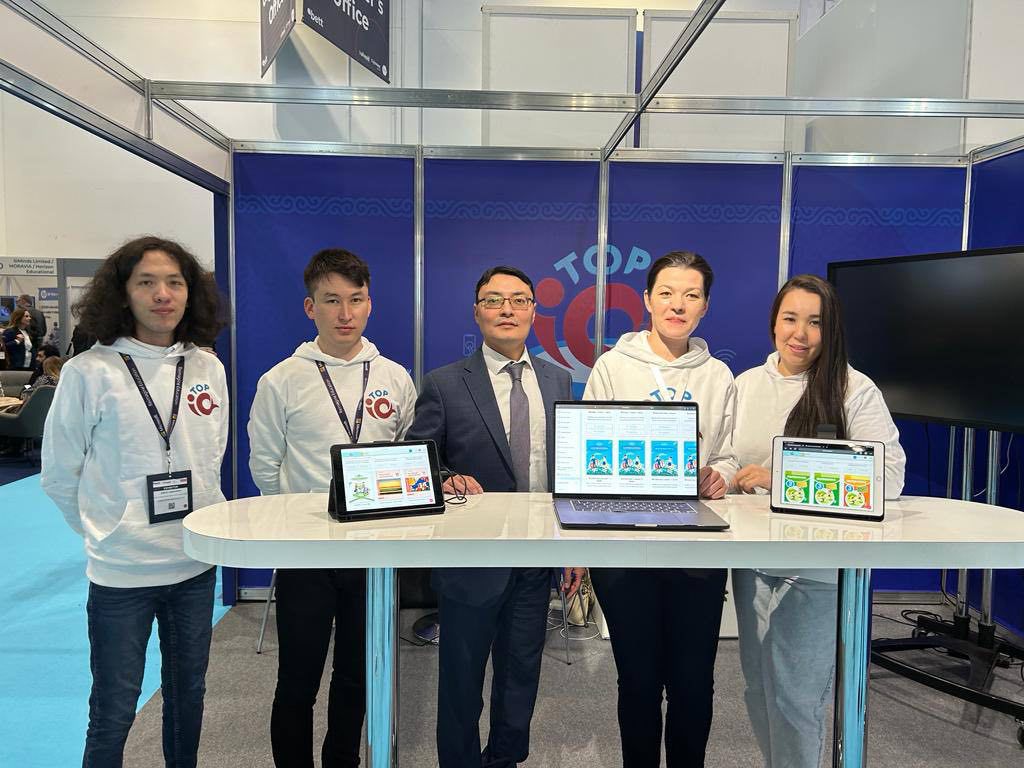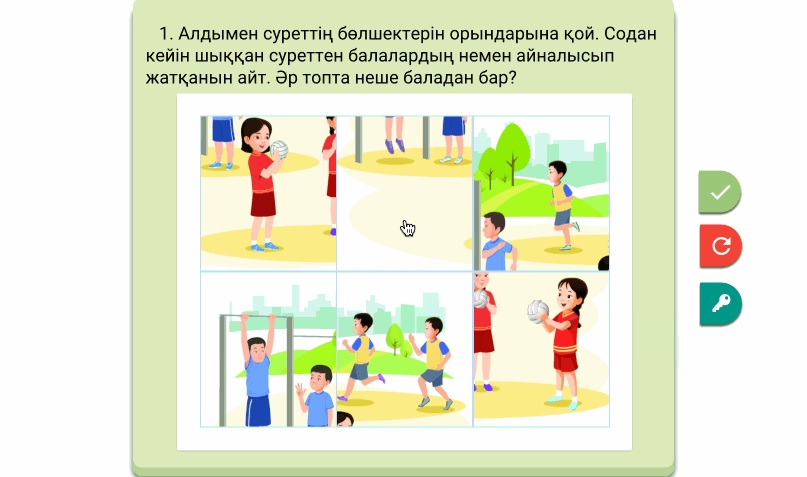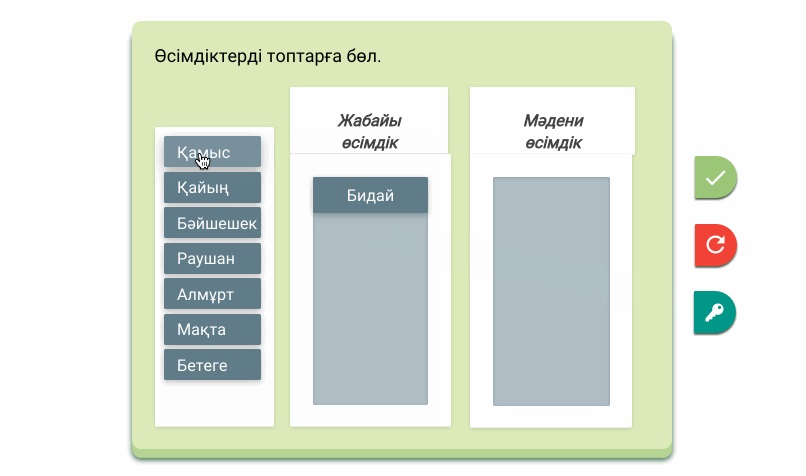ASTANA – The TopIQ platform offers digital books to children and teachers, spearheading a digital revolution along with other startups in the Kazakh education sector by harnessing technologies to enhance education opportunities for children.

From L to R: Vice President of Commercial Operations at Almatykitap Olesya Zhir, an education expert from Israel Ami Moyal, and Anelya Batalova. Photo credit: Almatykitap.
Starting as an idea during the pandemic, the platform, developed by Almatykitap, one of the nation’s oldest publishing houses, has found its audience even when the pandemic is over.
“Back in 2013, we realized digital technology was coming to education thoroughly and permanently. So in 2018, with Estonian partners, we were the first in the country to create an electronic textbook platform. After two academic years of use of the foreign platform, we financed the creation of a domestic platform of electronic textbooks, TopIQ.kz, which was tested in the academic year 2020,” Anelya Batalova, head of the digital content department at Almatykitap publishing house, told The Astana Times.
Through their electronic platform, the team created an immersive learning environment that captivates young minds while ensuring an interactive and enriching experience. Each electronic textbook on the platform is a single multimedia product, compiled per the curriculum and supplemented with various interactive tasks, audio-visual materials, animations, cartoons and fairy tales.

Fragment from the platform giving a task to collect a puzzle and then describe the picture.
She said they considered feedback from educators, pupils, and their parents, students and teachers of pedagogical colleges to develop the platform.
“We see a lively interest among teachers. Every day we get a lot of positive feedback, and it gives us confidence that in the near future, our TopIQ will become a reliable assistant for teachers and all Kazakhstan’s families,” she said.
The team acknowledges how swiftly and profoundly online learning has become integral to the education system. She noted that the pandemic just accelerated the changes the education system has long required.
“Many educators were saying long before the pandemic that the school system needed radical changes and that digital products were needed for a modern learning environment. We were inspired by children, perfectly equipped with modern gadgets, living in an information environment. They are the new Generation A [the group of individuals born between 2013 and 2025], the replacement of Generation Z [generation born in the late 1990s and early 2000s]. Today’s kids don’t part with their gadgets. Smartphones have become the main sources of information. This is why the TopIQ platform was created,” she explained.
The platform enables constant communication between children and teachers, regardless of geographical location or time zone, without downloading additional applications.

Exercise to match the words.
“The teacher easily hands out material for independent work. The teacher does not need to scan assignments, take pictures, or copy – something we see in regular schools. Textbooks contain all this. There is an opportunity to give additional material and send children to do independent work. The interactive tasks of TopIQ serve as a simulator: a child can do the task as many times as he or she needs to get the right result, but this includes the function of consolidating the material,” said Batalova.
The platform offers “space for studies, self-paced learning, a single web interface on all devices, and the development of different channels of perception.”
It also offers tools specifically tailored for educators, allowing them to enhance their teaching methods and create a dynamic classroom experience. These tools empower teachers with interactive lesson plans and customizable content, making it easier for them to engage their classes and foster a love for learning.
“For teachers, it is control over the learning process in real-time, the ability to use all the necessary components of the lesson, expanding the methods of work of the teacher, and increasing the motivation of the child in the process of performing tasks on the pages of the textbook, transparency of the learning process, high-quality video and audio content,” said Batalova.
The development of the platform was challenging because of a shortage of qualified IT specialists and a lack of educational resources, she added.
Now the platform features 108 textbooks for grades 1-11 in Kazakh and Russian from Almatykitap, Arman PV, and Edu Stream publishers. The developers are ready to post textbooks from other publishers of educational literature on the platform if their consent is obtained.
The representatives of Almatykitap continue visiting regions and meeting with school administrators to train them in using the platform.
“Digital education will not limit schools to classical teaching methods and tools. The learning process itself will become much broader, engaging students more effectively than ever and offering everything they need for a successful learning experience. The curriculum will evolve more rapidly. There will no longer be the constraints of published books and manuals. The most up-to-date information will always be at your fingertips, and the IT technologies of the future will help to create lessons that are more diverse and more exciting,” they said.
While the debate on whether print books are still finding their place in a rapidly evolving digital environment persists, Batalova said they believe that print books are a thing of the past.
“Standard school textbooks, for example, are still in use but are being gradually phased out as students themselves prefer electronic versions of textbooks and teaching aids. It will not be possible to avoid the digitalization of education, just as it cannot be done with any other sphere of human activity. Technology will take everyone into the future, and people need to prepare for it and adapt in time. How smoothly the process will go and how useful the digitalization will be depends on the technical means and competence of the teachers. A lot of work needs to be done so that the level of education does not suffer,” they said.
The Kazakh electronic platform has garnered attention and interest from international educators at the latest Bett Show in London in March. The Bett Show is an internationally renowned education technology event that brings together educators, policymakers, technology providers, and innovators worldwide.
The event’s six global themes were devoted to one broader theme, Create the Future.
“It was the first time TopIQ was evaluated in the international arena. It was nice to hear that we received the status of EdTech winners. This is a recognition of the loyalty of the chosen path and the value of the work of the entire team of our publishing house, as well as a great contribution to the recognition of Kazakhstan as a digital country,” said Batalova.
